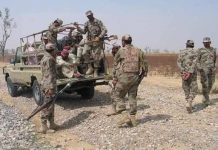Baloch “pro-independence” leader Dr Allah Nazar Baloch has urged the Baloch people to maintain unity and resilience in their struggle for freedom, arguing that the Pakistani state has failed to suppress the growing movement.
In a message published in Ispar, the Balochistan Liberation Front’s (BLF) monthly magazine, Dr Baloch said the continuity of the Baloch national liberation struggle had pushed the state into psychological disarray.
Quoting a Punjabi political figure, he claimed: “A Punjabi leader once said, ‘Wherever you see a Baloch, shoot him.’ Perhaps that short-sighted individual is unaware that his predecessors began this practice shortly after the creation of Pakistan.”
“The Baloch have carried the bodies of their loved ones when they demanded water. They’ve shed blood for electricity and received corpses in return when asking for food. The ones who bury people alive are someone else,” he said.
Dr Baloch said the Baloch nation had come to realise that silence in the face of oppression amounted to slow genocide. He added that unlike previous movements, the current struggle has grown stronger and more inclusive over the past two decades.
He pointed to enforced disappearances and the discovery of mass graves as evidence of state brutality.
“Despite all state terrorism, oppression and genocide, the Baloch nation has not bowed,” he said.
Dr Baloch dismissed recent claims by the military that it had “changed the rules of the game”, stating: “The Baloch had already rewritten those rules long ago.”
He accused the Pakistani state—particularly the Punjab region—of exploiting Balochistan’s natural resources while ignoring human rights and resorting to violence to maintain control.
Dr Baloch urged the Baloch people to stay committed to the struggle and to avoid internal divisions.
“Nations are not destroyed by war or famine, but by internal discord and superficial divisions,” he said. “Unity, awareness and confidence are our guarantees of survival.”
He praised the discipline and strategy of Baloch fighters, calling their approach “unparalleled in the region.”
“This level of conscious and practical participation in a national liberation movement is rare in recent history,” he said.
Dr Baloch warned that Balochistan should not be compared to past conflict zones such as Jaffna, Ireland or Swat.
“Despite access to modern technology and local agents, the enemy remains unfamiliar with Balochistan’s geography,” he said. “If they truly understand the cost of their losses, the best option is to leave Balochistan.”
He repeated longstanding allegations that the Gwadar port and newly constructed airport are being used for military purposes. He claimed that Chinese submarines and People’s Liberation Army (PLA) personnel are already present in Gwadar.
“This region may become a new hotspot in the global contest over warm waters,” he said, adding that even the head of Pakistan’s intelligence agency had admitted the army no longer knew how many soldiers it had lost in Balochistan.
Dr Baloch concluded with a warning that increased international involvement in the conflict could have significant consequences for Pakistan.
“If global powers become involved in this war,” he said, “Punjab may end up becoming part of a neighbouring country.”






























